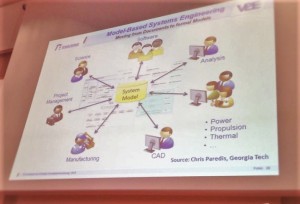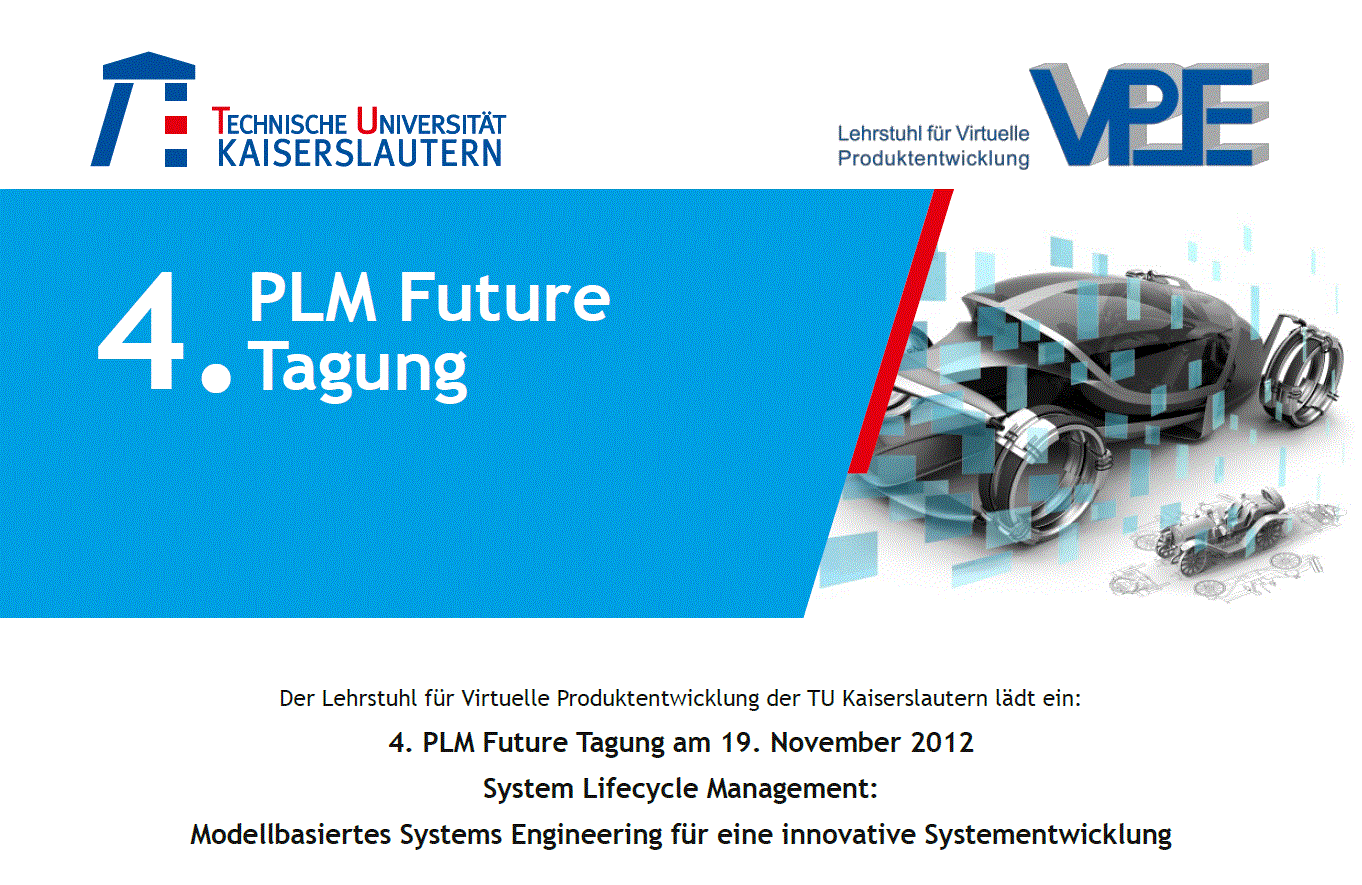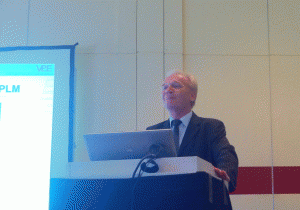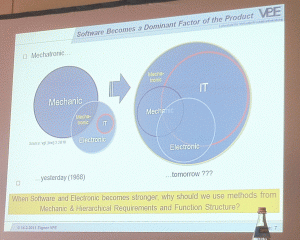4. PLM Future Tagung
Die Tagung stand unter dem Titelthema „Systems Lifecycle Management – Modellbasiertes Systems Engineering für eine innovative Systementwicklung“. Die Tagung fand am 19. November 2012 im Technoseum Mannheim statt. Veranstalter war der Lehrstuhl für Virtuelle Produktentwicklung (VPE) der Technischen Universität Kaiserslautern unter der Leitung von Prof. Dr.-Ing. Martin Eigner.
Das Tagungsprogramm bot neben verschiedener Fachvorträgen die Vorstellung aktueller Praxisbeispiele. Im Rahmen einer interaktiven Session konnten die Teilnehmer neueste Trends diskutieren und sich zu aktuellen Themen aus Praxis und Forschung austauschen.
Software & Elektronik
Prof. Eigner formulierte in seinem Keynote-Vortrag “Modellbasiertes Systems Engineering für eine innovative Systementwicklung” einen zentralen Gedanken, der sich als roter Faden durch die gesamte Veranstaltung zog:
“Wenn die Software- und Elektronik-Anteile in heutigen Produkten immer mehr zunehmen und weiter bestimmend werden, warum werden dann (noch) die klassischen Entwurfsmethoden der Mechanik eingesetzt? Wer hat bei zukünftigen Produktentwicklungen den Hut auf: der Maschinenbau-Ingenieur oder der Software-Techniker?”
“When Software and Electronics becomes stronger, why should we use methods from Mechanical & hierarchical Requirements and Function Structure?” ~ Prof. Martin Eigner
Interdisziplinäre Entwicklung durch Model-Based Systems Engineering
“Heutige technische Produkte sind multidisziplinäre Systeme, die nicht nur Komponenten der verschiedenen Ingenieurdisziplinen enthalten, sondern darüber hinaus von mehreren Ingenieurdisziplinen entwickelt werden. Eine innovative, multidisziplinäre Systementwicklung erfordert ein Überdenken klassischer Methoden, Prozesse, IT-Lösungen und Organisationsformen, wie sie aus der Produktentwicklung bekannt sind.”
 Vortrag von Prof. Dr. Chris Paredis: “Why Model‐Based Systems Engineering? – Benefits and Payoffs” vom Georgia Institute of Technology, Manufacturing Research Center.
Vortrag von Prof. Dr. Chris Paredis: “Why Model‐Based Systems Engineering? – Benefits and Payoffs” vom Georgia Institute of Technology, Manufacturing Research Center.
Aus dem Tagungsprogramm
Das neue “Systems Lifecycle Management” (SysLM) ist ein Konzept, um vorhandene Verfahrensweisen, Lösungen und Werkzeuge so miteinander zu verknüpfen, dass deren gemeinsames Ergebnis in weitaus besserem Maße als bislang zu wirtschaftlichem Erfolg führt. Model-based Systems Engineering (MBSE) ist innerhalb des SysLM-Konzepts ein multidisziplinärer Ansatz, der das Ziel verfolgt, eine ausgewogene Systemlösung als Reaktion auf diverse Stakeholder-Bedürfnisse zu entwickeln.
Der Ansatz hilft dem Ingenieur, den Überblick über komplexe Systeme zu behalten, die Zusammenhänge zu verstehen und sowohl Spezifikationen als auch definierte Anforderungen zu erfüllen. Im Mittelpunkt steht dabei das multidisziplinäre Systemmodell, welches als Ausgangsplattform für erste Systemsimulationen und für die Modellbildung in einzelnen Entwicklungsdisziplinen dienen soll.
Das Konzept des SysLM beschäftigt sich mit der Fragestellung, wie ein Systemmodell verwaltet werden kann, damit seine Weiternutzung im Entwicklungsprozess und eine Nachverfolgbarkeit zwischen diversen Produktmodellen gewährleistet ist. Ingenieure in Wissenschaft und Industrie arbeiten an Methoden und Konzepten als Antwort auf die Herausforderungen einer multidisziplinären Systementwicklung.
4th PLM Future Conference
The conference was held under the title “Systems Lifecycle Management – Model-based Systems Engineering for Innovative Systems Development”. The conference took place on November 19, 2012 at the Technoseum Mannheim. The organizer was the Chair of Virtual Product Development (VPE) at the Technical University of Kaiserslautern under the direction of Prof. Dr.-Ing. Martin Eigner.
The conference program offered, in addition to various technical presentations, the presentation of current practical examples. In an interactive session, the participants were able to discuss the latest trends and exchange ideas on current topics from practice and research.
Software & Electronics
In his keynote lecture “Model-based Systems Engineering for Innovative Systems Development”, Prof. Eigner formulated a central idea that ran as a thread through the entire event:
“If the software and electronics components in today’s products are increasing and becoming more and more determinant, why are the classic design methods of mechanics (still) being used? Who wears the hat in future product developments: the mechanical engineer or the software engineer?”
“Wenn Software und Elektronik immer stärker werden, warum sollten wir dann Methoden aus der Mechanik & hierarchischen Anforderungs- und Funktionsstruktur verwenden?” ~ Prof. Martin Eigner
Interdisciplinary development through Model-Based Systems Engineering
“Today’s technical products are multidisciplinary systems that not only contain components of different engineering disciplines, but are furthermore developed by several engineering disciplines. Innovative, multidisciplinary systems development requires a rethinking of classical methods, processes, IT solutions and organizational forms as they are known from product development.”
Presentation by Prof. Dr. Chris Paredis, “Why Model-Based Systems Engineering? – Benefits and Payoffs” from the Georgia Institute of Technology, Manufacturing Research Center.
From the conference program
The new “Systems Lifecycle Management” (SysLM) is a concept to link existing procedures, solutions and tools in such a way that their common result leads to economic success to a much better extent than before. Within the SysLM concept, Model-based Systems Engineering (MBSE) is a multidisciplinary approach that aims to develop a balanced system solution in response to diverse stakeholder needs.
The approach helps the engineer maintain an overview of complex systems, understand the interrelationships, and meet both specifications and defined requirements. The focus is on the multidisciplinary system model, which is intended to serve as a starting platform for initial system simulations and for model building in individual development disciplines.
The concept of SysLM addresses the question of how a system model can be managed to ensure its continued use in the development process and traceability between diverse product models. Engineers in science and industry are working on methods and concepts in response to the challenges of multidisciplinary system development.
Further information on MBSE
- Blog von Tim Weilkiens : model-based-systems-engineering.com
- Gesellschaft für Systems Engineering : mbse.gfse.de
- MBSE Wiki von INCOSE und OMG SE DSIG: www.omgwiki.org/MBSE
Definition: Model-based Systems Engineering
MBSE is a systems engineering methodology which focuses on creating and exploiting domain models as the primary means of information exchange between engineers, rather than on document-based information exchange.




